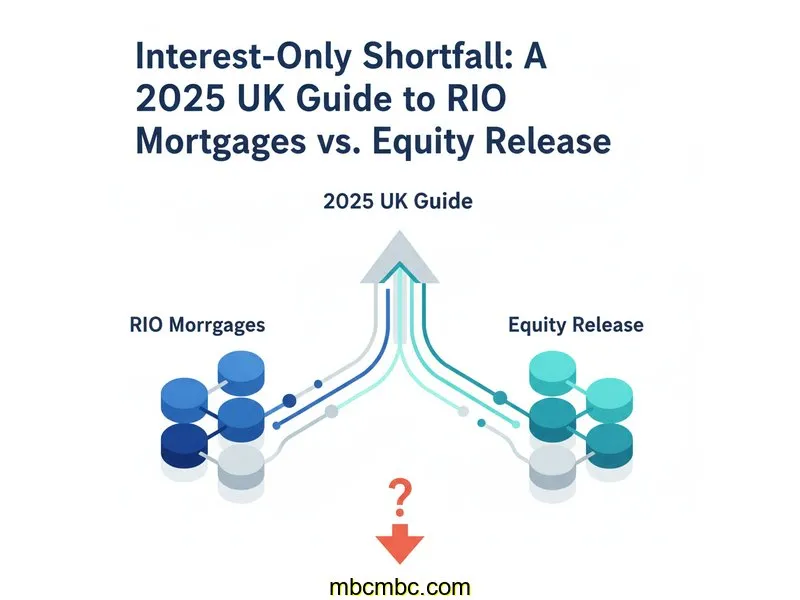
Picture this: a letter arrives from your mortgage lender. It’s not the usual annual statement. It’s a formal reminder that your 25-year interest-only mortgage term ends in 18 months, and the full capital balance of £180,000 is due. You look at your repayment vehicle—perhaps an endowment policy or an ISA—and find it's only worth £70,000. You have a £110,000 shortfall, and you're 63 years old. If you've felt that jolt of panic, you are far from alone.
This "interest-only time bomb" is a reality for a huge number of UK homeowners. The Financial Conduct Authority (FCA) has highlighted that around 1.1 million purely interest-only mortgages remain outstanding, with a significant peak of terms ending between 2028 and 2032 (FCA / UK Finance, 2024). For those nearing or in retirement, traditional remortgaging onto a capital repayment plan is often unaffordable. The question then becomes: what are the viable options *besides* selling your home? This guide explores the two primary later-life solutions: Retirement Interest-Only (RIO) mortgages and Lifetime Mortgages (Equity Release).
Key Takeaways
- The Core Problem: An estimated 1.1 million UK homeowners are on interest-only mortgages, many without a sufficient plan to repay the capital.
- RIO Mortgages: These allow you to continue paying only the interest for life, but require proof of ongoing (usually pension) income to pass affordability checks.
- Equity Release: A lifetime mortgage (the most common form) requires no monthly payments, but the interest "rolls up," compounding and increasing the total debt owed.
- The Key Difference: With a RIO, your debt stays level (you pay the interest), but you must prove affordability. With equity release, your debt grows, but there are no affordability checks.
- Disclaimer: This article provides informational guidance on complex financial products. It is not financial or legal advice. These are significant, lifelong financial decisions—you must consult a qualified, independent mortgage and equity release advisor for your specific situation.
The Shortfall Dilemma: Why Are RIOs and Equity Release Needed?
For decades, interest-only mortgages were popular, often sold alongside investment products like endowment policies, which were *supposed* to grow enough to clear the capital and (hopefully) provide a lump sum. Unfortunately, widespread underperformance of these investments left many with significant shortfalls. At the same time, stricter mortgage affordability rules introduced after the 2008 financial crisis make it much harder for someone in their late 50s or 60s to simply get a new 20-year capital repayment mortgage.
This creates a trap: you may have £400,000 of equity in your home but be unable to borrow the £110,000 you need to clear the original loan because your pension income doesn't meet a traditional lender's stress test. This is the specific problem that Retirement Interest-Only (RIO) mortgages and lifetime mortgages (equity release) were designed to solve. But they work in fundamentally different ways.
Comparing the Solutions: RIO vs. Equity Release vs. Term Extension
When you're facing a shortfall, you have several potential paths. Let's explore the pros and cons of the main solutions available to older homeowners. The table below breaks down the critical differences between a standard term extension (if available), a RIO mortgage, and a lifetime mortgage.
| Solution | How It Works | Typical Affordability Test (2025) | Impact on Your Debt | Impact on Inheritance |
|---|---|---|---|---|
| 1. Negotiated Term Extension | You ask your current lender to extend your interest-only term for 5-10 years to give you more time to find the capital. | Strict. You must prove a credible repayment strategy (e.g., downsizing, pension lump sum) and may need to show income. Often restricted to age 70-75. | Debt remains level. You continue paying interest. | No direct impact, but the debt must still be paid, usually from the estate or by selling the home. |
| 2. Retirement Interest-Only (RIO) Mortgage | A new mortgage where you pay only the interest each month. The term runs for your lifetime (or until you move into long-term care). | Based on Income. Lenders assess your current (or pending) pension/investment income. You must prove you can afford the interest payments indefinitely. | Debt remains level. You pay the interest monthly, so the capital balance never increases. | Inheritance is reduced by the fixed capital amount of the loan, which is repaid from your estate. |
| 3. Lifetime Mortgage (Equity Release) | A new mortgage where you pay no interest monthly. The interest is "rolled up" and added to the loan balance. | Based on Age & Property Value. There is no income affordability check. Your eligibility depends on your age (usually 55+) and your property's value. | Debt grows. Because of compounding interest, the total debt can double in 10-12 years. | Inheritance is significantly reduced by the original loan *plus* all the rolled-up, compounded interest. |
As the table shows, the choice hinges on one critical factor: **cash flow**. If you have sufficient, stable pension income to afford monthly interest payments, a RIO mortgage is often a strong consideration. If you don't, or you want to free up all your monthly cash flow, equity release becomes a primary option.
Deep Dive 1: How Does a RIO Mortgage Really Work?

Think of a RIO as a "pension-backed" mortgage. It’s like your original interest-only loan, but the lender's confidence is based on your pension income, not your salary. The loan runs for life—it only needs to be repaid when the *last* borrower dies or moves into permanent care.
The main hurdle is affordability. Lenders offering RIO mortgages typically require a minimum proven income, often from pensions or investments, in the range of **£15,000 to £20,000 per year** (Lender Criteria, 2025). But here's the crucial part: they must also stress-test your affordability based on a "sole survivor" scenario. If you're a couple, they will check if *one* of you could still afford the payments on their sole pension if the other passed away. This can be a major barrier for couples where one partner has a much larger pension.
Who is a RIO good for?
- Homeowners with a stable, provable pension income that comfortably covers the monthly interest.
- Those who want to protect the maximum amount of equity in their home to leave as inheritance.
- People who are comfortable (and able) to continue making monthly mortgage payments indefinitely.
Deep Dive 2: The Reality of Equity Release (Lifetime Mortgages)
A lifetime mortgage is the most common form of equity release. It's essentially a "reverse" mortgage. Instead of you paying the bank, the interest payments are simply added to the loan, which grows over time. No monthly payments are required.
The power of compounding interest works against you here. For example, the average interest rate for a new lifetime mortgage was **approximately 6.1% in late 2024** (Equity Release Council, 2024). On a £110,000 loan, this "rolled-up" interest means your debt would grow to over £200,000 in about 12 years. All reputable plans come with a "No Negative Equity Guarantee," meaning your estate will never owe more than what your home is sold for.
This solution clears your shortfall with no income checks, but the cost is a rapid erosion of your home's equity, which drastically reduces any potential inheritance. Some modern plans allow you to make voluntary payments to service some or all of the interest, which can slow down the compounding effect and make them behave more like a RIO.
Who is Equity Release good for?
- Homeowners who do *not* have the provable income to pass a RIO affordability test.
- Those who need to clear the shortfall *and* want to stop all monthly housing payments to free up cash flow.
- People for whom leaving a large inheritance is not the primary financial goal.
Common Questions on RIOs vs. Equity Release
Based on questions I've seen across forums like r/UKPersonalFinance and Mumsnet, here are the most common points of confusion when facing this decision.
My interest-only mortgage is ending and I have a shortfall. Can the bank force me to sell my home immediately?
No, repossession is an absolute last resort. Your lender is required by the FCA to treat you fairly. They will first contact you to discuss your options, which may include extending the term, converting part of the loan to capital repayment, or agreeing to a sale. They would much rather find a solution like a RIO or allow you to port to an equity release provider than go through a costly and lengthy repossession process. The key is to communicate with them early—don't ignore the letters.
I'm 58 and my interest-only term ends in 2 years. Can I get a term extension, or am I too old?
This depends entirely on the lender. Many mainstream lenders have a maximum age cap of 70 or 75 for their standard mortgages. However, the later-life lending market is different. You are old enough for a lifetime mortgage (55+) and well within the age range for a RIO (many start at 55 or 60 with no upper age limit, as long as you have the income). Your age isn't the barrier; it's about matching your financial profile (income vs. equity) to the right product.
If my RIO is for 'life', what happens if I need to move into a care home?
This is a standard clause in all RIO and lifetime mortgage contracts. The loan typically becomes repayable upon the (last) borrower's death or when they permanently move into long-term care. At that point, your home is sold, and the proceeds are used to pay off the capital (for a RIO) or the capital plus rolled-up interest (for equity release). Any remaining money goes to your estate.
Conclusion: Your Next Steps
Facing an interest-only mortgage shortfall is one of the most stressful financial events a homeowner can experience. The key takeaway is that you have more options than just "sell your home." The choice between a RIO mortgage and a lifetime mortgage (equity release) comes down to a simple trade-off: paying interest now (RIO) versus paying much more interest later (equity release).
Your first step should be to get a clear statement of your pension and investment income. Your second step is to speak to your current lender to understand what, if any, extensions they can offer. Your third, and most critical, step is to engage with an independent financial advisor who is qualified in *both* mortgages *and* equity release. Only they can review your entire financial picture—your income, equity, health, and inheritance goals—and provide a formal recommendation on the most suitable path for your specific circumstances.

